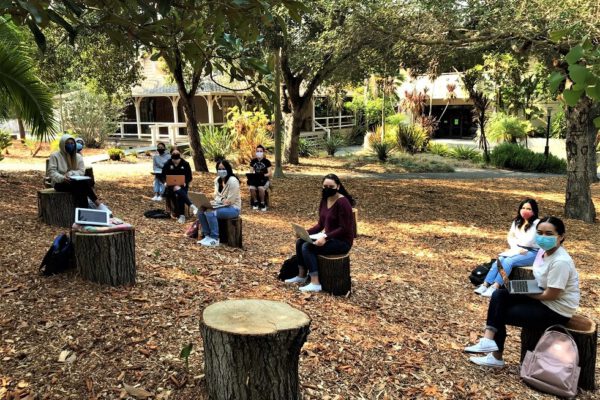By Nancy L. Thomas and Adam Gismondi
Early voting is underway, and Election Day is in less than a month. That is still enough time for presidents and other institutional leaders to inspire students to participate in this historic election and chart the nation’s future. In fact, the next three weeks are critical.
Our analysis of students at the 1,100+ colleges and universities participating in our National Study of Learning, Voting, and Engagement (NSLVE) [1] showed that although student registration rates are relatively high (more than 75 percent), only 53 percent of students who were registered ended up actually turning out to vote in 2018, a year in which activism and a backlash against the current administration were high. This yield rate needs to change, and the critical period to affect that is now. Last call!
We ask you to take a stand for student voting rights, engage the big questions about our democracy’s health and what’s at stake in this election, and double down to protect academic freedom and the right of educators to discuss political issues with students. In doing so, you are positioned to affect:
Your campus climate for political learning and participation in democracy. In our research of highly politically engaged campuses, we found that they manifested certain attributes. They intentionally fostered social cohesion across differences of ideology and identity. Students cultivated strong relationships with their professors and each other. Political conversations were pervasive across campus. Students had opportunities to discuss controversial political issues across disciplines, both in and beyond the classroom. Student leadership and activism, including around elections, were nurtured and encouraged. Underlying each of these characteristics was a strong sense of shared responsibility for each other’s learning, well-being, and success. Institutional leaders played critical roles in cultivating this climate by setting the tone, articulating institutional values, and interacting with students.
Future engagement and voice by this cohort of students. Voting is habit-forming. Voters tend to continue voting. You can ensure their future participation by helping them register and vote. Students need to know that their vote and voice matter. Nearly 20 million people attend colleges and universities today. Young people are now a larger group than the baby boomer generation, which gives a high share of potential political power and the ability to shape policy. Students need to know that by not voting, they are invisible to policymakers. Sadly, elected officials cater only to their voters, not to their entire constituency. Pollsters and future candidates will seek out voters for opinions, not nonvoters. Finally, not voting is a vote for the status quo. It signals neutrality, which may not be the message students intend to send.
Your legacy as an institutional leader who protected your students’ civil right to vote. Student voting rights are constantly under attack, and 2020 has exacerbated the issue to a dramatic level. College and university leaders have a platform to draw on resources to monitor local student voting conditions, lean on institutional experts to track and identify violations, and speak loudly when violations occur. This is not only about how you will be remembered at the institution as a force for student rights, but we know from our data that politically engaged campuses are characterized by an institutional ethic of care and support from leadership.
Consider this. The nation is facing a full-blown attack on the integrity of U.S. elections—attacks that rely on misinformation, lies about voter fraud, and threats of intimidation. The MIT-Stanford Healthy Elections Project is tracking hundreds of lawsuits pending over election mechanics, and NPR described 2020 as “the most litigated election yet.” We have heard from students who are confused and disillusioned, and who are wondering whether they should participate in a broken system. A lot of organizations, like the ACLU, the Fair Elections Center, the League of Women Voters, the Brennan Center for Justice, Election Protection, and the Andrew Goodman Foundation, are working hard to stop voter suppression, an effort we asked presidents to join.
This is a bipartisan effort. Count Every Vote, started by 30 political leaders from both sides of the political aisle that started the National Council on Election Integrity, is pressuring secretaries of state nationally to call the state vote only after all of the ballots have been processed. Institutional leaders can promote and even join this effort as part of messaging to support student participation, no matter the noise to the contrary.
The future of U.S. democracy. As an institute with the word “democracy” in our name, we often clarify to audiences that the democracy we speak to is an aspirational one. We seek a democracy that is informed and educated, equitable, representational and just, effectively and ethically governed, and inclusive and participatory. When elected officials on either side of the political aisle take positions that are antithetical to the values and goals of higher education or defy democratic principles and practices in public life, they deserve intellectual scrutiny. Admonishments and accusations around partisanship have had a chilling effect on speech on campus and on civic learning. Too often, educators are afraid to take a side on a political issue for fear of appearing partisan, and as a result, campuses are not doing enough talking about the stark choices and big questions facing students as voters. Educating for a just and inclusive democracy is the job and the reason institutions have the privilege of academic freedom.
The current generation of college students is the largest and most diverse in our nation’s history, and the work that is done now will help support many of the country’s future leaders in fulfilling that vision of the democracy to which we aspire.
[1] You can examine your NSLVE reports to see how your students compare. To make it easy, we sent the 1,100+ participating campuses top-line data on October 1. (Check your inboxes and spam boxes, and if you didn’t get it, let us know.)
If you have any questions or comments about this blog post, please contact us.


